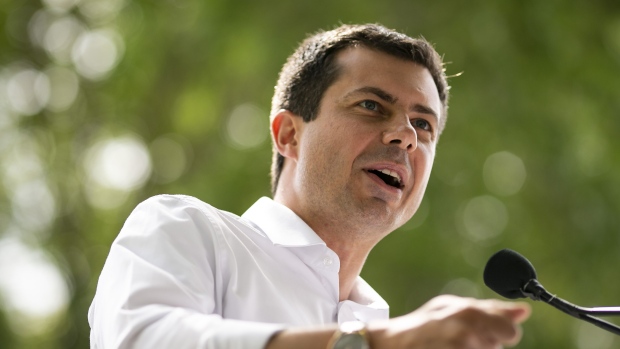Sep 9, 2019
2020 Candidates With Military Experience Struggle to Break Through
, Bloomberg News

(Bloomberg) -- Three Democratic 2020 candidates could boast of military service in America’s longest-running wars in Iraq and Afghanistan. But that experience is doing nothing for them in the current race.
Of the three veterans remaining in the Democratic campaign, Pete Buttigieg hasn’t cracked double digits in national polling. Tulsi Gabbard failed to qualify for the third debate in Houston on Thursday. Joe Sestak, a retired admiral, has 0% support in an aggregate of polls compiled by RealClearPolitics. A fourth, Seth Moulton, dropped out in August.
The combat veterans all launched their presidential bids by emphasizing their military expertise. But they have failed to catch fire with voters, even though U.S. troops remain in Afghanistan after 18 years and many Democrats have expressed frustration with presidents of both parties for failing to end overseas armed interventions such as those in Syria and Iraq.
Among the top candidates, Democratic front-runner Joe Biden and President Donald Trump both got deferments that helped them avoid service in the Vietnam war. Bernie Sanders was a conscientious objector. Elizabeth Warren, 70, and Kamala Harris, 54, didn’t serve either, but it is less expected of female candidates of their generations.
Patrick Murray, the director of the Monmouth University Polling Institute, said that while military service was a highly valued attribute when Democratic voters hewed to the center, it is less appealing now that the party is being pushed left by Sanders and Warren, whose focus on economic issues better reflects Americans’ concerns.
Trump and other presidents without military experience sometimes face a skeptical Pentagon and have to serve as commander-in-chief. Trump walked into a wall of criticism this weekend after announcing that secret talks with the Taliban were to be held at Camp David but that he canceled them after a U.S. soldier was killed.
A generation ago, military experience “would be a selling point even within a Democratic primary,” Murray said. “Here’s somebody that could appeal to ‘middle America.’ What we’re seeing is a Democratic primary where a large chunk of those voters are saying, ‘Appealing to the middle is not a part of the calculation for me.’”
The armed forces are one of the most highly esteemed institutions in the country, according to a 2017 Gallup poll, with 78% of Americans who profess a “great deal or quite a lot of confidence in the military.”
That was a factor during the 2018 midterms when a crop of Democratic candidates with military or national security experience helped their party get a majority in the House of Representatives by winning tight races in swing districts.
But foreign affairs rarely are a priority in recent presidential primaries. While every post-World War II president until Bill Clinton in 1992 had military experience, it has mattered less since then. The last veteran to clinch the Democratic nomination was John Kerry in 2004. For Republicans, it was John McCain in 2008.
In this election, Democratic voters can choose from the largest-ever field of candidates with a variety of policy proposals and experience, making military experience just one credential among many, according to Loren DeJonge Schulman, the Leon E. Panetta Senior Fellow at the Center for a New American Security, a non-partisan defense think tank.
“Though the military is the most trusted institution in the country, this is not a time in the presidential race where veteran’s status is going to make a massive difference in vote share, or in donor networks,” Schulman said in an email.
In response, all three veterans still in the race now talk about their policies and other elements of their resume beyond their service.
Buttigieg highlights his tenure as mayor of South Bend, Indiana, at least as much as his time as a Navy intelligence officer in Afghanistan.
“Being a community organizer is one way of showing who you are,” Buttigieg said during an MSNBC appearance in July. “Holding a different kind of office is one way of showing who you are. But serving in the military says something about who you are. And faking a disability in order to avoid serving in the military definitely says something about who you are.”
He was referring to Trump, who got a medical deferment for bone spurs, a claim some have found dubious given how many young men of privilege found ways to avoid serving in Vietnam. Trump, however, continues to enjoy high support among military veterans, according to a recent Pew Research survey.
Tulsi Gabbard, a major in the Hawaii Army National Guard, served tours of active duty in Iraq and Kuwait. In August, she withdrew from the campaign trail for two weeks to participate in a National Guard training mission in Indonesia.
The Hawaii representative has called for an end to U.S. military involvement in Iraq and Afghanistan and has attacked Trump’s “chicken-hawk Cabinet,” for inflaming tensions with Iran.
These positions helped her make the debate stage in June and July, even though she will not participate in the Houston debate on Thursday.
Joe Sestak, who served 31 years in the Navy, says he has focused on kitchen-table issues in his campaign.
”To me, when I’m running, I am trying to make the argument, it isn’t because I’m a vet,” Sestak said. The country, he said, “wants somebody who they feel is accountable to them.”
The former Pennsylvania representative, a latecomer to the race, hasn’t qualified for any debate so far and could have trouble sustaining his campaign.
To contact the reporter on this story: Daniel Flatley in Washington at dflatley1@bloomberg.net
To contact the editors responsible for this story: Wendy Benjaminson at wbenjaminson@bloomberg.net, Max Berley
©2019 Bloomberg L.P.







